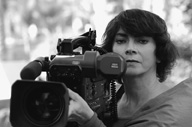Juror
Jocelyne Saab
 [Juror’s Statement]
[Juror’s Statement]
I have always wanted to see my own documentaries featured in the Yamagata film festival. To me, this is an innovative place rich with encounter and creativity; it’s set up differently from what I am used to, and it is a place that exhibits ambitious documentaries.
It was fate that brought me to begin a film festival in Beirut. I named it a festival of “Cultural Resistance.” This festival took place annually between 2013 and 2016—truly a period domestically marked by the overwhelming spread of war. I wanted (perhaps unconsciously even) to heal the wounds of war by entering a different space—one that does not exist here, but one with imagination. As a result, I sought help from the films that arrived here from Asia. At that time, the person in charge of the program was a great critic from Singapore, Philip Cheah. As the founder of the Singapore International Film Festival, he has unearthed numerous talents thus far.
Philip took me by the hand and brought me into the world of unforgettable Yamagata documentaries. In particular, I remember clearly a film full of poetic sentiment depicting the rescue of a horse left in Fukushima following the aftermath of the nuclear disaster. To us, this film seemed to be a true example by which the terms “art” and “culture” are no longer synonymous with “cultural duty,” but with understanding and commitment.
About a year ago, I met Yomota Inuhiko, a great Japanese critic and author. I opened up to him about how much I truly adored the Yamagata film festival. Afterwards, by some magic, I am now a judge at this very place. To me, there is no greater honor than this.
Thank you, Yamagata.
*Please also see “Jocelyne Saab’s Lebanon and Beirut” in the Politics and Film program.
Born in Beirut, 1948. Receiving attention with her first feature-length documentary, Lebanon in Turmoil (1975), she also released works about Iran, the Polisario Front of Western Sahara, and Vietnam. While making her Beirut trilogy, she simultaneously worked for Volker Schlöndorff’s Circle of Deceit (1981) as assistant director. Her major works include her first narrative film, Suspended Life (1985); Once Upon a Time in Beirut (1994), dedicated to the anniversary of a century of cinema and the founding of the Lebanese cinematheque; and Dunia (2005). In recent years, her photo installations and her art film What’s Going On (2010) were acclaimed internationally. Saab also founded the organization Cultural Resistance, and in 2013, she became the organizer and curator of the Tripoli Film Festival, Lebanon’s first film festival featuring films of Asia and the Mediterranean area.
Once Upon a Time in Beirut: The Story of a Star
Il était une fois Beyrouth, histoire d’une star LEBANON, FRANCE, GERMANY / 1994 / French, Arabic, English / Color, B&W / 35mm / 104 min
LEBANON, FRANCE, GERMANY / 1994 / French, Arabic, English / Color, B&W / 35mm / 104 min
Director: Jocelyne Saab
Script: Philippe Paringaux, Roland Paringaux, Jocelyne Saab
Photography: Roby Breidi Sound: Pierre Bouvier-Donnadieu, Jean-Pierre Delorme
Editing: Dominique Auvray, Isabelle Dedieu Cast: Michele Tyan, Myrna Maakaron, Emile Accar
Production Companies: Balcon Production, France; Hessicher Rundfunk Arte; Arte Strazbourg; Aleph Production, Beirut
Saab researched and viewed around 300 films, old and modern, Eastern and Western, made between 1910 and 1970 to make this magnum opus, which reassembles a selection of clips from them to tell a story that unfolds in Beirut. Two twenty-year-old women, Yasmin and Leila, are its protagonists. Footage used includes a romantic comedy by Youssef Chahine, a gangster film starring Jean-Paul Belmondo, shots of De Gaulle during the military occupation, Brigitte Bardot riding a camel (Serge Gainsbourg’s reggae version of La Marseillaise plays alongside), and a political thriller starring Diane Keaton as an Israeli spy. As the protagonists, who belong to Lebanon’s civil war generation, jump around within the film searching for their lost history, we are treated to a myriad of ways to look at Beirut. An adventure story that combines scathing criticism with lighthearted entertainment.
